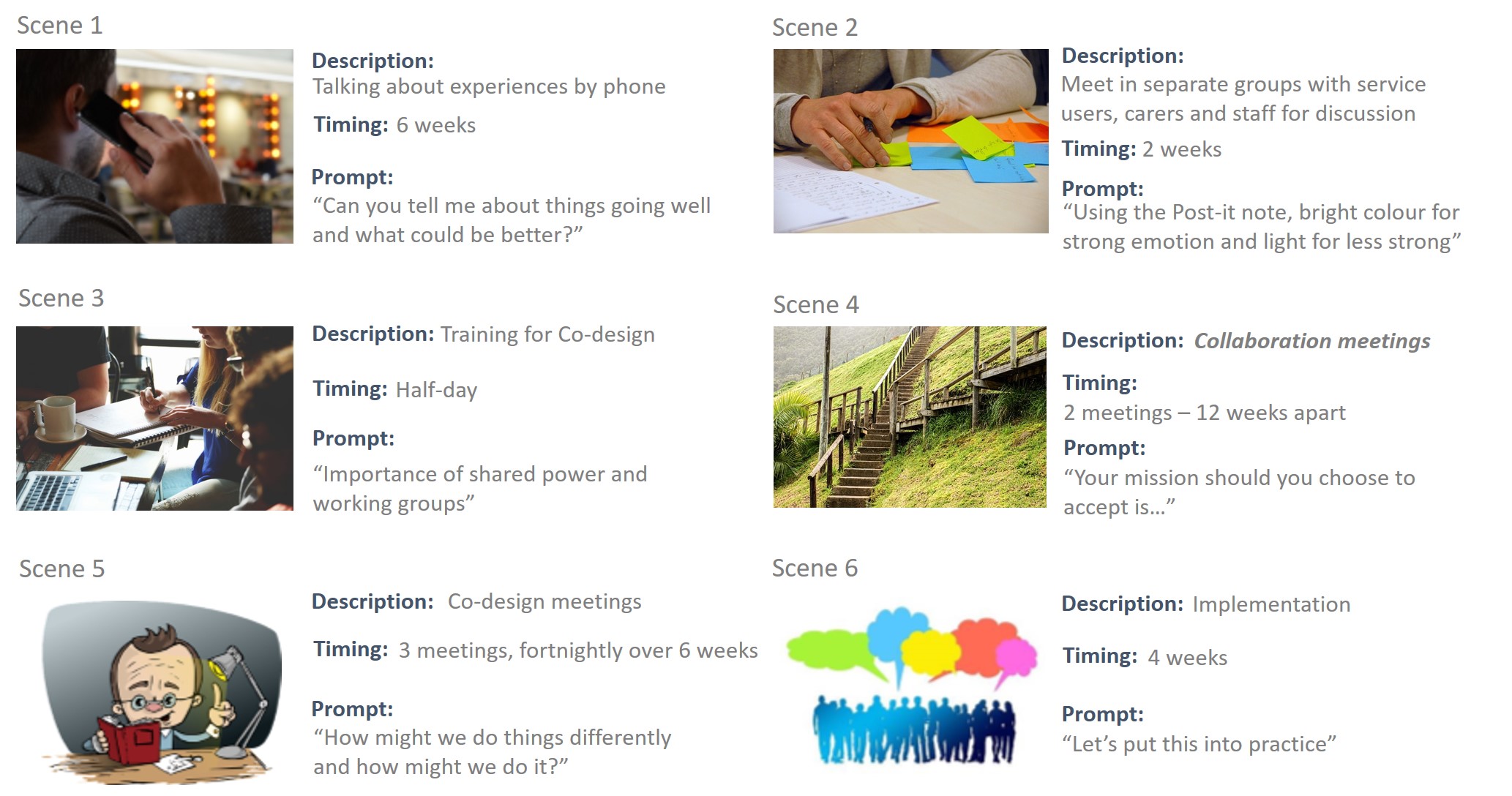The CORE Study
-
Principal Investigator

Prof Victoria Palmer+61 3 8344 4987
Project Details
 The CORE Study was a world first trial to build an evidence base about service user, carer and staff engagement in service re-design and psychosocial recovery. Over four years (2013-2017) CORE tested if a modified version of the novel Mental Health Experience Co-Design (MH ECO) improved psychosocial recovery outcomes, quality of life and recovery orientation of services for people living with severe mental illness (see Figure 1 below that describes the intervention).
The CORE Study was a world first trial to build an evidence base about service user, carer and staff engagement in service re-design and psychosocial recovery. Over four years (2013-2017) CORE tested if a modified version of the novel Mental Health Experience Co-Design (MH ECO) improved psychosocial recovery outcomes, quality of life and recovery orientation of services for people living with severe mental illness (see Figure 1 below that describes the intervention).
The trial engaged over 450 people receiving or delivering non-clinical mental health services across Victoria. 133 people participated in co-design training and interventions to improve services. Peer workers were trained to support recruitment processes and the study worked in partnership with David Granirer from Stand up for Mental Health in Canada to use comedy for change to reduce stigma about mental illness [1].

Figure 1. Storyboard of MH ECHO adapted intervention
CORE led to the development of a purposive engagement model to work with people experiencing severe mental illness [2]. The team developed the first explanatory model of change to examine impact and outcomes from co-design and co-production in quality improvement [3]. The CORE trial attracted global attention with the delivery of seven invited international presentations (e.g. to Kings College London & MedicineX Stanford University). The team were awarded the Australasian Academic Association for Primary Care (AAAPC) Most Distinguished Paper in 2018 which was delivered in two conference plenary sessions.
From CORE we established our Co-Design Living Labs model to support participation in research design, delivery, improvement and translation across the health care setting. The study identified that people experiencing severe mental illnesses attend general practitioners on average 14 times a year, but over half who reported physical health conditions did not have the documented management plans that they should. This led directly to our current NHMRC first Australian primary care trial to improve heart health for people who live with severe mental illness. The CORE program of work has contributed to translational activities with: the Agency for Clinical Innovation, NSW Health (co-design capabilities); the Victorian Dept of Health and Human Services (lived experience mental health engagement framework) and community mental health service improvement [4].
Led by Prof Victoria Palmer (Researcher in Primary Mental Health Care), this 4-year study was conducted in partnership with the Victorian Mental Illness Awareness Council and Tandem, the peak body representing mental health carers across the state.
Final trial outcomes are currently in-press.
References
- Dimopoulos-Bick T. Palmer V. et al 2018. Challenges of co-design. Jrn of Health Design 3(1):86-93.
- The Core Study Protocol 2015. BMJ Open; 5(3): 1-15. FWCI 3.01
- Explanatory Model of Change. 2019. BMJ Medical Humanities 45(3):247-257; FWCI 36.
- Mulvale G. et al. 2019.Co-designing health and other public services. Health Expectations. 22:282-297.
Researchers
Professor Victoria Palmer, Lead Investigator, Department of General Practice (University of Melbourne)
Professor Jane Gunn, Department of General Practice (University of Melbourne)
Professor Helen Herrman, Orygen: The National Centre for Excellence in Youth Mental Health)
Rosemary Callander Department of General Practice (The University of Melbourne)
Mr Wayne Weavell, Department of General Practice (University of Melbourne), Expertise in Consumer Research
Professor John Furler, Department of General Practice (University of Melbourne)
Dr Donella Piper, School of Health (University of New England), Expertise in Health Service Management
Professor Rick Iedema Monash Warwick Professor of Healthcare Improvement and Implementation Science, Monash Centre for Health Research and Implementation, School of Public Health and Preventive Medicine, Faculty of Medicine, Nursing and Health Sciences
Associate Professor David Pearce, Department of Rural Health (University of Melbourne)
A/Prof Patty Chondros, Biostatistician, Department of General Practice (University of Melbourne)
Ms Konstancja Densley, Data Manager, Department of General Practice (University of Melbourne)
Ms Kali Godbee, Senior Research Assistant and Trial Coordination, Department of General Practice (University of Melbourne)
Ms Roxanne Kritharidis, Research Support Officer and Intervention Coordinator, Department of General Practice (University of Melbourne)
Ms Maria Potiriadis, Trial Coordinator, Department of General Practice (University of Melbourne)
Collaborators
Collaborating partners include Victorian Mental Illness Awareness Council (VMIAC) and Tandem: Representing Victorian mental health carers.
Funding
The CORE study received funding from the Mental Illness Research Fund and the Psychiatric Illness an Intellectual Disability Donations Trust Fund (MIRF). The Mental Illness Research Fund aims to support the collaborative research into mental illness that may lead to better treatment and recovery outcomes for Victorians with mental illness and their families and carers.
Research Outcomes
Selected publications
- Palmer VJ, Chondros P, Piper D, Callander R, Weavell W, Godbee K, Potiriadis M, Richard L, Densely K, Herrman H, Furler J, Pierce D, Schuster T, Iedema R, Gunn J. The CORE study protocol: a stepped wedge cluster randomised controlled trial to test a co-design technique to optimise psychosocial recovery outcomes for people affected by mental illness in the community mental health setting. BMJ Open 2015; 5(3)
- Palmer V, and the CORE study team. Getting to the CORE of the links between engagement, experience and recovery outcomes. New Paradigm 2015; Summer: 41-45.
- Whitley R, Palmer V, Gunn J. Recovery from Severe Mental Illness. Canadian Medical Association Journal CMAJ 2015 22 September; 187(13): 951-952.
- Whitley R. Palmer V. Gunn J. Harnessing Primary Care to Enhance Recovery from Severe Mental Illness. British Journal of General Practice 2015; 65 (637): 429-30.
- Palmer, VJ, Piper D, Richard L, Furler J, Herrman H, Cameron J, Godbee K, Pierce D, Callander R, Weavell W, Gunn J, Iedema R. Balancing opposing forces—A nested process evaluation study protocol for a stepped wedge designed cluster randomized controlled trial of an experience based codesign intervention: The CORE study. International Journal of Qualitative Methods 2016: 15(1)
- Richard L, Piper D, Weavell W, Callander R, Iedema R, Furler J, Pierce D, Godbee K, Gunn J, Palmer V. Advancing engagement methods for trials: the CORE study relational model of engagement for a stepped wedge cluster randomised controlled trial of experience-based co-design for people living with severe mental illnesses. Trials 2017: 18(1): 169.
- Palmer VJ,Weavell W, Callander R, Piper D, Richard L, Maher L, Boyd H, Herrman H, Furler J, Gunn J, Iedema R, Robert G. The Participatory Zeitgeist: An explanatory theoretical model of change in an era of coproduction and codesign in healthcare improvement. Medical humanities 2019: (45.3): 247-257.
Selected conference presentations
- Palmer V, Harvey C, Gunn J, Davidson S. Developing a primary care response to the physical health crisis for people living with severe mental illnesses. World Psychiatry Association Thematic Congress 24 February 2018, Melbourne Australia.
- Palmer V, Gunn J, Herrman H, Callander R, Weavell W, Furler J, Piper D, Pierce D, Iedema R. A silent crisis – a primary care response to the physical health needs of people with severe mental illness (The CORE Study). Presented at the Primary Health Care Research Conference 8 June 2016, Canberra Australia.
- Palmer V, Godbee K, Richard L, Piper D, Callander R, Weavell W, Furler J, Pierce D, Herrman H, Gunn J. A relational model of engagement to recruit people with severe mental illness and their carers to a cluster randomised controlled trial (The CORE Study) (Poster). Presented at the International Qualitative Methods Conference 26-28 April 2015, Melbourne Australia.
- Palmer V, Richard L, Godbee K, Piper D, Callander R, Weavell W, Herrman H, Furler J, Pierce D, Gunn J, Iedema R. A relational model of engagement: recruitment and retention of people with serious mental illnesses, their carers and staff to a complex intervention in the community mental health setting. Presented to the PHCRIS Conference 29-31 July 2015, Adelaide Australia.
- Palmer V, Weavell W, Callander R. Translating experience based co-design into a best practice reality for mental health service design and planning. Presented to The Mental Health Services (THEMHS) Conferences August 26-28th 2015, Canberra Australia.
- Palmer V, Chondros P, Piper D, et al., 2014 The CORE Study Protocol: a stepped wedge cluster randomised controlled trial to test a co-design techniques to optimise psychosocial recovery outcomes for people affected by mental illness in the community mental health setting. Presented at the 15th International Mental Health Conference – Mental Health: Innovation, Integration, Early Intervention 25-27 August 2014, Gold Coast, Australia.
- Callander R, Weavell W, Palmer V, Ban L. (2013). Getting to the CORE: Testing a co-design technique to optimise psychosocial recovery outcomes for people affected by mental illness. Presentation at the Mental Health Services Conference “Forging the Future: Challenging Attitudes! Creating Connections! Transforming Lives”, 20-23 August, Melbourne Convention & Exhibition Centre, South Wharf, Melbourne Victoria.
- Callander R, Weavell W, Fairhurst K. (2013) MH ECO. Presentation at the Mental Health Services Conference “Forging the Future: Challenging Attitudes! Creating Connections! Transforming Lives”, 20-23 August, Melbourne Convention & Exhibition Centre, South Wharf, Melbourne Victoria.
Invited Presentations
- Palmer V. 2015. The engagement nexus and psychosocial recovery. MIND Colloquium Series 22nd July 2015, Melbourne Australia.
- Palmer V. 2015. The engagement nexus and psychosocial recovery: the CORE study. Presented to the Adult Mental Clinical Leaders meeting of the Department of Health and Human Services 24th September 2015.
- Palmer V. 2015. The engagement nexus and psychosocial recovery: the CORE study. Presented to the Adult Mental Clinical Leaders meeting of the Department of Health and Human Services 13th October 2015
- Furler J. (2013).Getting to the CORE: Testing a co-design technique to optimise psychosocial recovery outcomes for people affected by mental illness. Presentation at the launch of the MIRF launch. 7th August, Melbourne Victoria.
International Presentations
- Palmer V. 'This week is the same as every week': short diaries as a method to elicit insights into everyday life routines, practices, thoughts and feelings of people living with severe mental illnesses. Qualitative Methods Conference 2 May 2018, Banff, Canada.
- Palmer V. 2014. Getting to the CORE – the journey so far. Presented to the Experience Based Co-Design in Mental Health UK network. 10 September 2014. South Bank, London South Bank University.
- Palmer V. 2014. The CORE Study Protocol: a stepped wedge cluster randomised controlled trial to test a co-design technique to optimise psychosocial recovery outcomes for people affected by mental illness in the community mental health setting. Presented to the Health Experiences Research Institute, Nuffield Department of Primary Health Care Sciences 18 September 2014, Oxford, The University of Oxford.
- Chondros P. (2013). Testing the effectiveness of a co-design technique to optimise psychosocial recovery: a stepped wedge cluster randomised trial. Presentation at the Centre for Primary Care and Public Health, Blizard Institute, Barts and The London School of Medicine and Dentistry, 17 July, 2013, London, England.
- Gunn J. (2012). Getting to the CORE: Testing a co-design technique to optimise psychosocial recovery outcomes for people affected by mental illness, Forum for International collaborative research initiative to design interventions for patients with multi-morbidity in primary health care, North American Primary Care Research Group meeting, New Orleans, USA.
Research Group
Faculty Research Themes
School Research Themes
Key Contact
For further information about this research, please contact the research group leader.
Department / Centre
General Practice and Primary Care
MDHS Research library
Explore by researcher, school, project or topic.